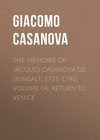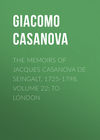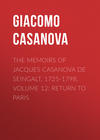Читать книгу: «The Memoirs of Jacques Casanova de Seingalt, 1725-1798. Volume 07: Venice», страница 5
The oracle answered negatively.
M. Dandolo, rather surprised, asked a second question: he wished Paralis to give his reasons for the denial.
I formed the cabalistic pile, and brought out this answer:
"I asked Casanova's opinion, and as I find it opposed to the proposal made by De la Haye, I do not wish to hear any more about it."
Oh! wonderful power of self-delusion! This worthy man, pleased at being able to throw the odium of a refusal on me, left me perfectly satisfied. I had no idea of the nature of the affair to which he had been alluding, and I felt no curiosity about it; but it annoyed me that a Jesuit should interfere and try to make my friends do anything otherwise than through my instrumentality, and I wanted that intriguer to know that my influence was greater than his own.
After that, I dressed, masked myself, and went to the opera, where I sat down to a faro-table and lost all my money. Fortune was determined to shew me that it does not always agree with love. My heart was heavy, I felt miserable; I went to bed. When I woke in the morning, I saw De la Haye come into my room with a beaming countenance, and, assuming an air of devoted friendship, he made a great show of his feelings towards me. I knew what to think of it all, and I waited for the 'denouement'.
"My dear friend," he said to me at last, "why did you dissuade M. Dandolo from doing what I had insinuated to him?"
"What had you insinuated to him?"
"You know well enough."
"If I knew it, I would not ask you!"
"M. Dandolo himself told me that you had advised him against it."
"Advised against, that may be, but certainly not dissuaded, for if he had been persuaded in his own mind he would not have asked my advice."
"As you please; but may I enquire your reasons?"
"Tell me first what your proposal was."
"Has he not told you?"
"Perhaps he has; but if you wish to know my reasons, I must hear the whole affair from your own lips, because M. Dandolo spoke to me under a promise of secrecy."
"Of what good is all this reserve?"
"Everyone has his own principles and his own way of thinking: I have a sufficiently good opinion of you to believe that you would act exactly as I do, for I have heard you say that in all secret matters one ought to guard against surprise."
"I am incapable of taking such an advantage of a friend; but as a general rule your maxim is a right one; I like prudence. I will tell you the whole affair. You are aware that Madame Tripolo has been left a widow, and that M. Dandolo is courting her assiduously, after having done the same for fourteen years during the life of the husband. The lady, who is still young, beautiful and lovely, and also is very respectable, wishes to become his wife. It is to me that she has confided her wishes, and as I saw nothing that was not praiseworthy, either in a temporal or in a spiritual point of view, in that union, for after all we are all men, I took the affair in hand with real pleasure. I fancied even that M. Dandolo felt some inclination for that marriage when he told me that he would give me his decision this morning. I am not astonished at his having asked your advice in such an important affair, for a prudent man is right in asking the opinion of a wise friend before taking a decisive step; but I must tell you candidly that I am astonished at your disapproval of such a marriage. Pray excuse me if, in order to improve by the information, I ask why your opinion is exactly the reverse of mine."
Delighted at having discovered the whole affair, at having arrived in time to prevent my friend who was goodness itself contracting an absurd marriage, I answered the hypocrite that I loved M. Dandolo, that I knew his temperament, and that I was certain that a marriage with a woman like Madame Tripolo would shorten his life.
"That being my opinion," I added, "you must admit that as a true friend I was right in advising him against your proposal. Do you recollect having told me that you never married for the very same reason? Do you recollect your strong arguments in favour of celibacy while we were at Parma? Consider also, I beg, that every man has a certain small stock of selfishness, and that I may be allowed to have mine when I think that if M. Dandolo took a wife the influence of that wife would of course have some weight, and that the more she gained in influence over him the more I should lose. So you see it would not be natural for me to advise him to take a step which would ultimately prove very detrimental to my interests. If you can prove that my reasons are either trifling or sophistical, speak openly: I will tell M. Dandolo that my mind has changed; Madame Tripolo will become his wife when we return to Venice. But let me warn you that thorough conviction can alone move me."
"I do not believe myself clever enough to convince you. I shall write toMadame Tripolo that she must apply to you."
"Do not write anything of the sort to that lady, or she will think that you are laughing at her. Do you suppose her foolish enough to expect that I will give way to her wishes? She knows that I do not like her."
"How can she possibly know that?"
"She must have remarked that I have never cared to accompany M. Dandolo to her house. Learn from me once for all, that as long as I live with my three friends they shall have no wife but me. You may get married as soon as you please; I promise not to throw any obstacle in your way; but if you wish to remain on friendly terms with me give up all idea of leading my three friends astray."
"You are very caustic this morning."
"I lost all my money last night.
"Then I have chosen a bad time. Farewell."
From that day, De la Haye became my secret enemy, and to him I was in a great measure indebted, two years later, for my imprisonment under The Leads of Venice; not owing to his slanders, for I do not believe he was capable of that, Jesuit though he was—and even amongst such people there is sometimes some honourable feeling—but through the mystical insinuations which he made in the presence of bigoted persons. I must give fair notice to my readers that, if they are fond of such people, they must not read these Memoirs, for they belong to a tribe which I have good reason to attack unmercifully.
The fine marriage was never again alluded to. M. Dandolo continued to visit his beautiful widow every day, and I took care to elicit from Paralis a strong interdiction ever to put my foot in her house.
Don Antonio Croce, a young Milanese whom I had known in Reggio, a confirmed gambler, and a downright clever hand in securing the favours of Dame Fortune, called on me a few minutes after De la Haye had retired. He told me that, having seen me lose all my money the night before, he had come to offer me the means of retrieving my losses, if I would take an equal interest with him in a faro bank that he meant to hold at his house, and in which he would have as punters seven or eight rich foreigners who were courting his wife.
"If you will put three hundred sequins in my bank," he added, "you shall be my partner. I have three hundred sequins myself, but that is not enough because the punters play high. Come and dine at my house, and you will make their acquaintance. We can play next Friday as there will be no opera, and you may rely upon our winning plenty of gold, for a certain Gilenspetz, a Swede, may lose twenty thousand sequins."
I was without any resources, or at all events I could expect no assistance except from M. de Bragadin upon whom I felt ashamed of encroaching. I was well aware that the proposal made by Croce was not strictly moral, and that I might have chosen a more honourable society; but if I had refused, the purse of Madame Croce's admirers would not have been more mercifully treated; another would have profited by that stroke of good fortune. I was therefore not rigid enough to refuse my assistance as adjutant and my share of the pie; I accepted Croce's invitation.
CHAPTER XIV
I Get Rich Again—My Adventure At Dolo—Analysis of a Long Letter From C.C.—Mischievous Trick Played Upon Me By P. C.—At Vincenza—A Tragi-comedy At the Inn
Necessity, that imperious law and my only excuse, having made me almost the partner of a cheat, there was still the difficulty of finding the three hundred sequins required; but I postponed the task of finding them until after I should have made the acquaintance of the dupes of the goddess to whom they addressed their worship. Croce took me to the Prato delta Valle, where we found madame surrounded with foreigners. She was pretty; and as a secretary of the imperial ambassador, Count Rosemberg, had attached himself to her, not one of the Venetian nobles dared court her. Those who interested me among the satellites gravitating around that star were the Swede Gilenspetz, a Hamburger, the Englishman Mendez, who has already been mentioned, and three or four others to whore Croce called my attention.
We dined all together, and after dinner there was a general call for a faro bank; but Croce did not accept. His refusal surprised me, because with three hundred sequins, being a very skilful player, he had enough to try his fortune. He did not, however, allow my suspicions to last long, for he took me to his own room and shewed me fifty pieces of eight, which were equal to three hundred sequins. When I saw that the professional gambler had not chosen me as his partner with the intention of making a dupe of me, I told him that I would certainly procure the amount, and upon that promise he invited everybody to supper for the following day. We agreed that we would divide the spoils before parting in the evening, and that no one should be allowed to play on trust.
I had to procure the amount, but to whom could I apply? I could ask no one but M. de Bragadin. The excellent man had not that sum in his possession, for his purse was generally empty; but he found a usurer—a species of animal too numerous unfortunately for young men—who, upon a note of hand endorsed by him, gave me a thousand ducats, at five per cent. for one month, the said interest being deducted by anticipation from the capital. It was exactly the amount I required. I went to the supper; Croce held the bank until daylight, and we divided sixteen hundred sequins between us. The game continued the next evening, and Gilenspetz alone lost two thousand sequins; the Jew Mendez lost about one thousand. Sunday was sanctified by rest, but on Monday the bank won four thousand sequins. On the Tuesday we all dined together, and the play was resumed; but we had scarcely begun when an officer of the podesta made his appearance and informed Croce that he wanted a little private conversation with him. They left the room together, and after a short absence Croce came back rather crestfallen; he announced that by superior orders he was forbidden to hold a bank at his house. Madame fainted away, the punters hurried out, and I followed their example, as soon as I had secured one-half of the gold which was on the table. I was glad enough it was not worse. As I left, Croce told me that we would meet again in Venice, for he had been ordered to quit Padua within twenty-four hours. I expected it would be so, because he was to well known; but his greatest crime, in the opinion of the podesta, was that he attracted the players to his own house, whilst the authorities wanted all the lovers of play to lose their money at the opera, where the bankers were mostly noblemen from Venice.
I left the city on horseback in the evening and in very bad weather, but nothing could have kept me back, because early the next morning I expected a letter from my dear prisoner. I had only travelled six miles from Padua when my horse fell, and I found my left leg caught under it. My boots were soft ones, and I feared I had hurt myself. The postillion was ahead of me, but hearing the noise made by the fall he came up and disengaged me; I was not hurt, but my horse was lame. I immediately took the horse of the postillion, to which I was entitled, but the insolent fellow getting hold of the bit refused to let me proceed. I tried to make him understand that he was wrong; but, far from giving way to my arguments, he persisted in stopping me, and being in a great hurry to continue my journey I fired one of my pistols in his face, but without touching him. Frightened out of his wits, the man let go, and I galloped off. When I reached the Dolo, I went straight to the stables, and I myself saddled a horse which a postillion, to whom I gave a crown, pointed out to me as being excellent. No one thought of being astonished at my other postillion having remained behind, and we started at full speed. It was then one o'clock in the morning; the storm had broken up the road, and the night was so dark that I could not see anything within a yard ahead of me; the day was breaking when we arrived in Fusina.
The boatmen threatened me with a fresh storm; but setting everything at defiance I took a four-oared boat, and reached my dwelling quite safe but shivering with cold and wet to the skin. I had scarcely been in my room for a quarter of an hour when the messenger from Muran presented herself and gave me a letter, telling me that she would call for the answer in two hours. That letter was a journal of seven pages, the faithful translation of which might weary my readers, but here is the substance of it:
After the interview with M. de Bragadin, the father of C– C– had gone home, had his wife and daughter to his room, and enquired kindly from the last where she had made my acquaintance. She answered that she had seen me five or six times in her brother's room, that I had asked her whether she would consent to be my wife, and that she had told me that she was dependent upon her father and mother. The father had then said that she was too young to think of marriage, and besides, I had not yet conquered a position in society. After that decision he repaired to his son's room, and locked the small door inside as well as the one communicating with the apartment of the mother, who was instructed by him to let me believe that she had gone to the country, in case I should call on her.
Two days afterwards he came to C– C–, who was beside her sick mother, and told her that her aunt would take her to a convent, where she was to remain until a husband had been provided for her by her parents. She answered that, being perfectly disposed to submit to his will, she would gladly obey him. Pleased with her ready obedience he promised to go and see her, and to let his mother visit her likewise, as soon as her health was better. Immediately after that conversation the aunt had called for her, and a gondola had taken them to the convent, where she had been ever since. Her bed and her clothes had been brought to her; she was well pleased with her room and with the nun to whom she had been entrusted, and under whose supervision she was. It was by her that she had been forbidden to receive either letters or visits, or to write to anybody, under penalty of excommunication from the Holy Father, of everlasting damnation, and of other similar trifles; yet the same nun had supplied her with paper, ink and books, and it was at night that my young friend transgressed the laws of the convent in order to write all these particulars to me. She expressed her conviction respecting the discretion and the faithfulness of the messenger, and she thought that she would remain devoted, because, being poor, our sequins were a little fortune for her.
She related to me in the most assuring manner that the handsomest of all the nuns in the convent loved her to distraction, gave her a French lesson twice a-day, and had amicably forbidden her to become acquainted with the other boarders. That nun was only twenty-two years of age; she was beautiful, rich and generous; all the other nuns shewed her great respect. "When we are alone," wrote my friend, "she kisses me so tenderly that you would be jealous if she were not a woman." As to our project of running away, she did not think it would be very difficult to carry it into execution, but that it would be better to wait until she knew the locality better. She told me to remain faithful and constant, and asked me to send her my portrait hidden in a ring by a secret spring known only to us. She added that I might send it to her by her mother, who had recovered her usual health, and was in the habit of attending early mass at her parish church every day by herself. She assured me that the excellent woman would be delighted to see me, and to do anything I might ask her. "At all events," she concluded, "I hope to find myself in a few months in a position which will scandalize the convent if they are obstinately bent upon keeping me here."
I was just finishing my answer when Laura, the messenger, returned for it. After I had paid the sequin I had promised her, I gave her a parcel containing sealing-wax, paper, pens, and a tinder-box, which she promised to deliver to C– C–. My darling had told her that I was her cousin, and Laura feigned to believe it.
Not knowing what to do in Venice, and believing that I ought for the sake of my honour to shew myself in Padua, or else people might suppose that I had received the same order as Croce, I hurried my breakfast, and procured a 'bolletta' from the booking-office for Rome; because I foresaw that the firing of my pistol and the lame horse might not have improved the temper of the post-masters; but by shewing them what is called in Italy a 'bolletta', I knew that they could not refuse to supply me with horses whenever they had any in their stables. As far as the pistol-shot was concerned I had no fear, for I had purposely missed the insolent postillion; and even if I had killed him on the spot it would not have been of much importance.
In Fusina I took a two-wheeled chaise, for I was so tired that I could not have performed the journey on horseback, and I reached the Dolo, where I was recognized and horses were refused me.
I made a good deal of noise, and the post-master, coming out, threatened to have me arrested if I did not pay him for his dead horse. I answered that if the horse were dead I would account for it to the postmaster in Padua, but what I wanted was fresh horses without delay.
And I shewed him the dread 'bolletta', the sight of which made him lower his tone; but he told me that, even if he supplied me with horses, I had treated the postillion so badly that not one of his men would drive me. "If that is the case," I answered, "you shall accompany me yourself." The fellow laughed in my face, turned his back upon me, and went away. I took two witnesses, and I called with them at the office of a public notary, who drew up a properly-worded document, by which I gave notice to the post-master that I should expect an indemnity of ten sequins for each hour of delay until I had horses supplied to me.
As soon as he had been made acquainted with the contents of this, he gave orders to bring out two restive horses. I saw at once that his intention was to have me upset along the road, and perhaps thrown into the river; but I calmly told the postillion that at the very moment my chaise was upset I would blow his brains out with a pistol-shot; this threat frightened the man; he took his horses back to the stables, and declared to his master that he would not drive me. At that very moment a courier arrived, who called for six carriage horses and two saddle ones. I warned the post-master that no one should leave the place before me, and that if he opposed my will there would be a sanguinary contest; in order to prove that I was in earnest I took out my pistols. The fellow began to swear, but, everyone saying that he was in the wrong, he disappeared.
Five minutes afterwards whom should I see, arriving in a beautiful berlin drawn by six horses, but Croce with his wife, a lady's maid, and two lackeys in grand livery. He alighted, we embraced one another, and I told him, assuming an air of sadness, that he could not leave before me. I explained how the case stood; he said I was right, scolded loudly, as if he had been a great lord, and made everybody tremble. The postmaster had disappeared; his wife came and ordered the postillions to attend to my wants. During that time Croce said to me that I was quite right in going back to Padua, where the public rumour had spread the report of my having left the city in consequence of an order from the police. He informed me that the podesta had likewise expelled M. de Gondoin, a colonel in the service of the Duke of Modena, because he held a faro bank at his house. I promised him to pay him a visit in Venice in the ensuing week. Croce, who had dropped from the sky to assist me in a moment of great distress, had won ten thousand sequins in four evenings: I had received five thousand for my share; and lost no time in paying my debts and in redeeming all the articles which I had been compelled to pledge. That scamp brought me back the smiles of Fortune, and from that moment I got rid of the ill luck which had seemed to fasten on me.
I reached Padua in safety, and the postillion, who very likely out of fear had driven me in good style, was well pleased with my liberality; it was the best way of making peace with the tribe. My arrival caused great joy to my three friends, whom my sudden departure had alarmed, with the exception of M. de Bragadin, in whose hands I had placed my cash-box the day before. His two friends had given credence to the general report, stating that the podesta had ordered me to leave Padua. They forgot that I was a citizen of Venice, and that the podesta could not pass such a sentence upon me without exposing himself to legal proceedings. I was tired, but instead of going to bed I dressed myself in my best attire in order to go to the opera without a mask. I told my friends that it was necessary for me to shew myself, so as to give the lie to all that had been reported about me by slandering tongues. De la Haye said to me,
"I shall be delighted if all those reports are false; but you have no one to blame but yourself, for your hurried departure gave sufficient cause for all sorts of surmises."
"And for slander."
"That may be; but people want to know everything, and they invent when they cannot guess the truth."
"And evil-minded fools lose no time in repeating those inventions everywhere."
"But there can be no doubt that you wanted to kill the postillion. Is that a calumny likewise?"
"The greatest of all. Do you think that a good shot can miss a man when he is firing in his very face, unless he does it purposely?"
"It seems difficult; but at all events it is certain that the horse is dead, and you must pay for it."
"No, sir, not even if the horse belonged to you, for the postillion preceded me. You know a great many things; do you happen to know the posting regulations? Besides, I was in a great hurry because I had promised a pretty woman to breakfast with her, and such engagements, as you are well aware, cannot be broken."
Master de la Haye looked angry at the rather caustic irony with which I had sprinkled the dialogue; but he was still more vexed when, taking some gold out of my pocket, I returned to him the sum he had lent me in Vienna. A man never argues well except when his purse is well filled; then his spirits are pitched in a high key, unless he should happen to be stupefied by some passion raging in his soul.
M. de Bragadin thought I was quite right to shew myself at the opera without a mask.
The moment I made my appearance in the pit everybody seemed quite astonished, and I was overwhelmed with compliments, sincere or not. After the first ballet I went to the card-room, and in four deals I won five hundred sequins. Starving, and almost dead for want of sleep, I returned to my friends to boast of my victory. My friend Bavois was there, and he seized the opportunity to borrow from me fifty sequins, which he never returned; true, I never asked him for them.
My thoughts being constantly absorbed in my dear C– C–, I spent the whole of the next day in having my likeness painted in miniature by a skilful Piedmontese, who had come for the Fair of Padua, and who in after times made a great deal of money in Venice. When he had completed my portrait he painted for me a beautiful St. Catherine of the same size, and a clever Venetian jeweller made the ring, the bezel of which shewed only the sainted virgin; but a blue spot, hardly visible on the white enamel which surrounded it, corresponded with the secret spring which brought out my portrait, and the change was obtained by pressing on the blue spot with the point of a pin.
On the following Friday, as we were rising from the dinner-table, a letter was handed to me. It was with great surprise that I recognized the writing of P– C–. He asked me to pay him a visit at the "Star Hotel," where he would give me some interesting information. Thinking that he might have something to say concerning his sister, I went to him at once.
I found him with Madame C–, and after congratulating him upon his release from prison I asked him for the news he had to communicate.
"I am certain," he said, "that my sister is in a convent, and I shall be able to tell you the name of it when I return to Venice."
"You will oblige me," I answered, pretending not to know anything.
But his news had only been a pretext to make me come to him, and his eagerness to communicate it had a very different object in view than the gratification of my curiosity.
"I have sold," he said to me, "my privileged contract for three years for a sum of fifteen thousand florins, and the man with whom I have made the bargain took me out of prison by giving security for me, and advanced me six thousand florins in four letters of exchange."
He shewed me the letters of exchange, endorsed by a name which I did not know, but which he said was a very good one, and he continued,
"I intend to buy six thousand florins worth of silk goods from the looms of Vicenza, and to give in payment to the merchants these letters of exchange. I am certain of selling those goods rapidly with a profit of ten per cent. Come with us to Vicenza; I will give you some of my goods to the amount of two hundred sequins, and thus you will find yourself covered for the guarantee which you have been kind enough to give to the jeweller for the ring. We shall complete the transaction within twenty-four hours."
I did not feel much inclination for the trip, but I allowed myself to be blinded by the wish to cover the amount which I had guaranteed, and which I had no doubt I would be called upon to pay some day or other.
"If I do not go with him," I said to myself "he will sell the goods at a loss of twenty-five per cent., and I shall get nothing."
I promised to accompany him. He shewed me several letters of recommendation for the best houses in Vicenza, and our departure was fixed for early the next morning. I was at the "Star Hotel" by daybreak. A carriage and four was ready; the hotel-keeper came up with his bill, and P– C– begged me to pay it. The bill amounted to five sequins; four of which had been advanced in cash by the landlord to pay the driver who had brought them from Fusina. I saw that it was a put-up thing, yet I paid with pretty good grace, for I guessed that the scoundrel had left Venice without a penny. We reached Vicenza in three hours, and we put up at the "Cappello," where P– C– ordered a good dinner before leaving me with the lady to call upon the manufacturers.
When the beauty found herself alone with me, she began by addressing friendly reproaches to me.
"I have loved you," she said, "for eighteen years; the first time that I saw you we were in Padua, and we were then only nine years old."
I certainly had no recollection of it. She was the daughter of the antiquarian friend of M. Grimani, who had placed me as a boarder with the accursed Sclavonian woman. I could not help smiling, for I recollected that her mother had loved me.
Shop-boys soon began to make their appearance, bringing pieces of goods, and the face of Madame C– brightened up. In less than two hours the room was filled with them, and P– C– came back with two merchants, whom he had invited to dinner. Madame allured them by her pretty manners; we dined, and exquisite wines were drunk in profusion. In the afternoon fresh goods were brought in; P– C– made a list of them with the prices; but he wanted more, and the merchants promised to send them the next day, although it was Sunday. Towards the evening several counts arrived, for in Vicenza every nobleman is a count. P– C– had left his letters of recommendation at their houses. We had a Count Velo, a Count Sesso, a Count Trento—all very amiable companions. They invited us to accompany them to the casino, where Madame C– shone by her charms and her coquettish manners. After we had spent two hours in that place, P– C– invited all his new friends to supper, and it was a scene of gaiety and profusion. The whole affair annoyed me greatly, and therefore I was not amiable; the consequence was that no one spoke to me. I rose from my seat and went to bed, leaving the joyous company still round the festive board. In the morning I came downstairs, had my breakfast, and looked about me. The room was so full of goods that I did not see how P– C– could possibly pay for all with his six thousand florins. He told me, however, that his business would be completed on the morrow, and that we were invited to a ball where all the nobility would be present. The merchants with whom he had dealt came to dine with us, and the dinner was remarkable for its extreme profusion.
We went to the ball; but I soon got very weary of it, for every body was speaking to Madame C– and to P– C–, who never uttered a word with any meaning, but whenever I opened my lips people would pretend not to hear me. I invited a lady to dance a minuet; she accepted, but she looked constantly to the right or to the left, and seemed to consider me as a mere dancing machine. A quadrille was formed, but the thing was contrived in such a manner as to leave me out of it, and the very lady who had refused me as a partner danced with another gentleman. Had I been in good spirits I should certainly have resented such conduct, but I preferred to leave the ball-room. I went to bed, unable to understand why the nobility of Vicenza treated me in such a way. Perhaps they neglected me because I was not named in the letters of introduction given to P– C–, but I thought that they might have known the laws of common politeness. I bore the evil patiently, however, as we were to leave the city the next day.





















